Case studies
Worsley, Haslingden, Lancashire
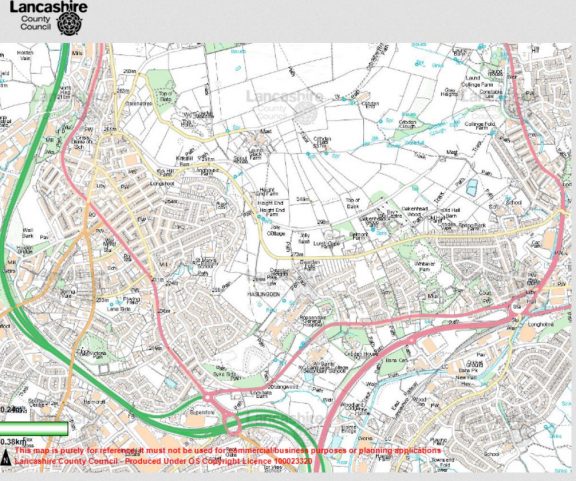
The neighbourhood
Worsley Neighbourhood for Learning (NFL) is part of Haslingden town in the Rossendale Borough of east Lancashire. It is a mix of urban and rural communities and it is culturally diverse. The Neighbourhood Resilience Programme (NRP) in Worsley sought to explore how local action could tap into existing initiatives to improve community wellbeing by enhancing social connectedness amongst those who lived and worked in the neighbourhood.
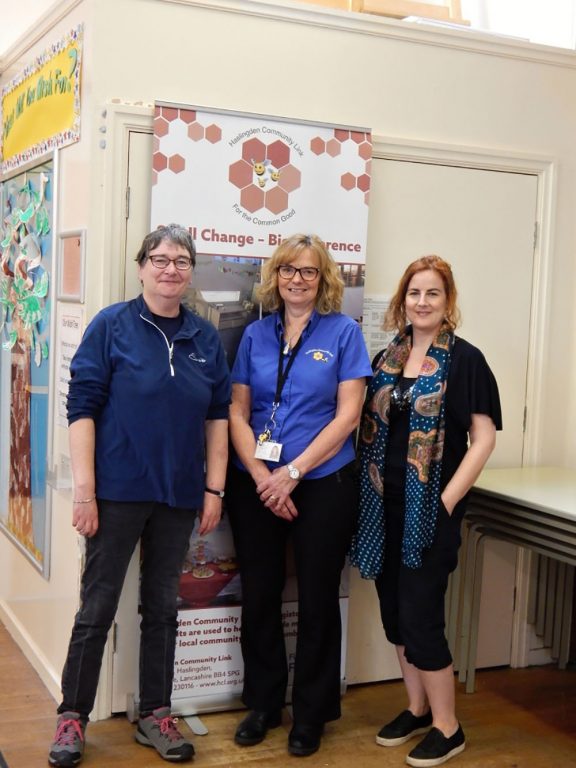
The neighbourhood players
The Neighbourhood Resilience Programme in Worsley involved local residents who helped to identify priorities for the neighbourhood along with other stakeholders. In the lifetime of the programme, eleven Worsley residents served as registered Resident Advisers and an estimated 230 people engaged with programme-related activities.
Other neighbourhood players involved in the NRP as members of the Local Oversight Group included the Lancashire County Council Community Projects Team and their ‘Connecting East Lancashire’ project, Haslingden Community Link (the COREN organisation), Rossendale Borough Council, APNA Rossendale (a community organisation working within South Asian communities to support local women), Credit Union, Burnley Pendle Rossendale CVS and the NHS East Lancashire Clinical Commissioning Group.
Links with other organisations and groups in the area were also established. These included Haslingden Civic Pride, the British Legion, Rossendale Radio, Together Lancashire, Near Neighbours Fund, Living Well, Living Better project, St. James Church, local GP Practices, Made in Haslingden (a local group for people with dementia) and REAL (Rossendale Enterprise Anchor Limited).
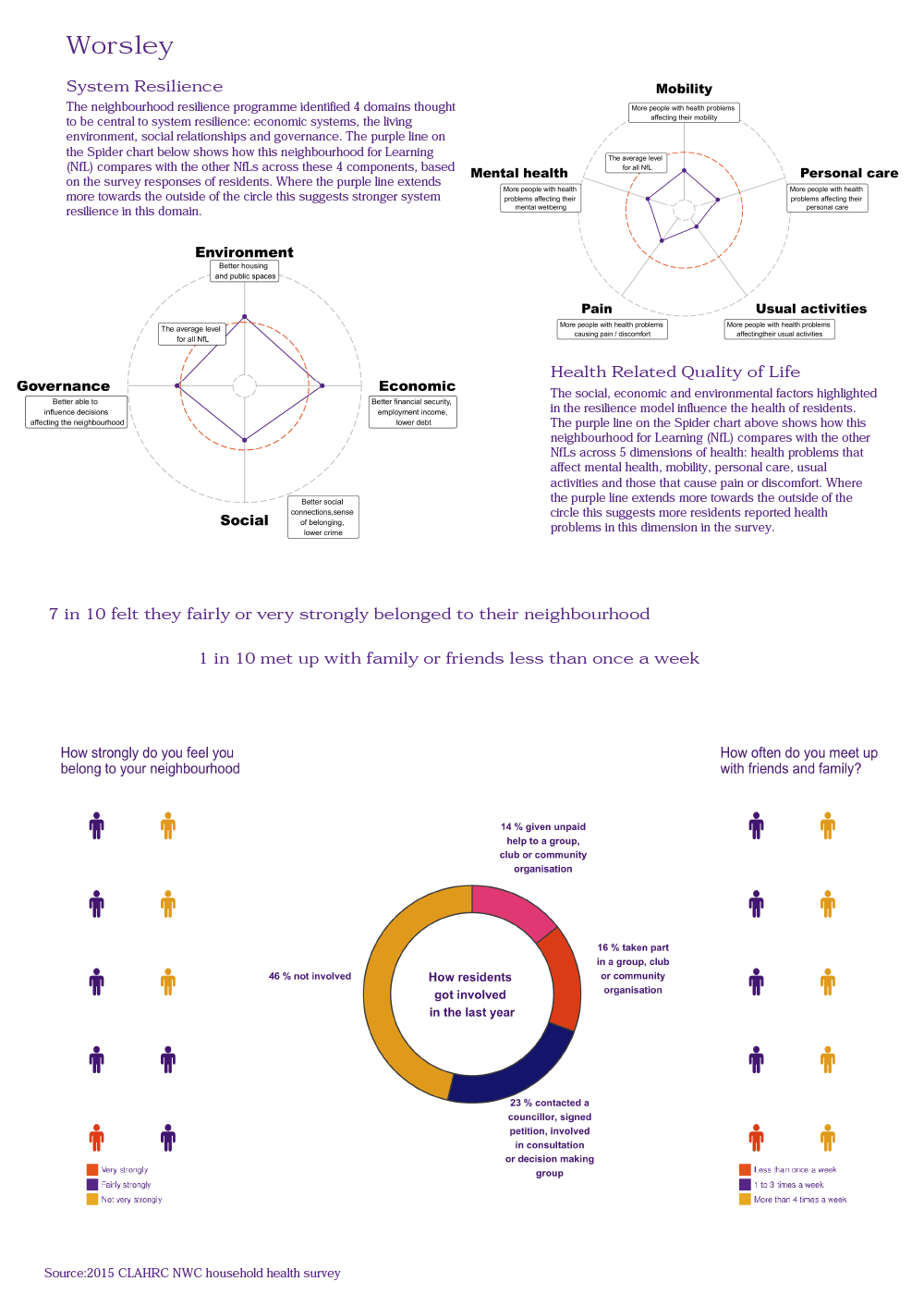
Implementation: enhancing systems resilience
The NRP worked with residents and community groups to identify the main issues affecting Worsley. From these initial conversations, social connectedness was a key concern affecting a wide range of residents. A questionnaire was then designed collaboratively by residents and key partners as part of a participatory enquiry to gather further views from residents and community organisations about social connectedness.
Bringing the system together
Early informal conversations started in 2016 taking the form of open Resident Conversation Events. Fact-finding work by the Academic Lead began in the same year. A formal stakeholder meeting took place in April 2017. Two further community organisation networking events took place in February and November 2018 bringing together local service providers and community groups to explore ways of working together and the ways in which representatives of local organisations could link into the programme and support action.
Surfacing local concerns and identifying priorities for action
The main concerns to emerge from this work were:
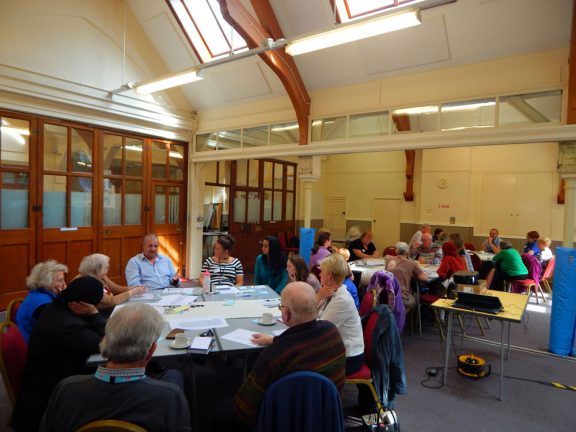
Main concerns about the area
- lack of awareness of community activities and a need for more co-ordination between community groups and service providers as well as lack of knowledge about whom / which organisation to contact about an issue affecting their area;
- desire to get more residents active and engaged in the local community;
- need for more opportunities for ‘connectedness’ between the different social and ethnic groups, especially people who might be isolated or face challenges in meeting with or in socialising with others;
- transport barriers and how they negatively impact connectedness.
In light of these issues, local activity focused on ‘social connectedness’ aiming to increase social interaction/socialising and engagement between different social groups, organisations and communities in the neighbourhood.
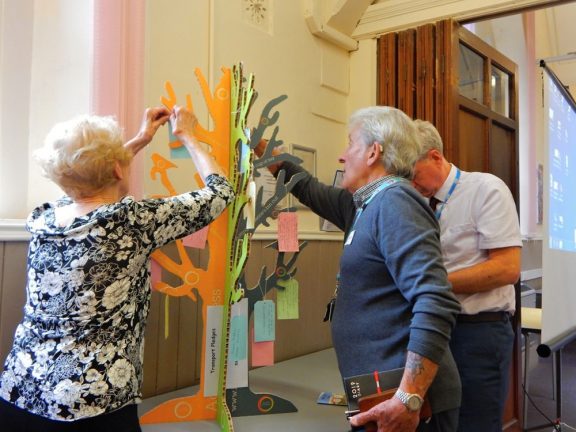
MOBILISING KNOWLEDGE
1. Enquiries on experiences of community and social isolation
Resident Advisers undertook a participative enquiry on experiences of social isolation and community in Haslingden. A questionnaire on social activities in the area was created and distributed. Ninety-five residents completed the questionnaire which explored three key issues: where people go or what they do to connect with others; what barriers prevent people from connecting with others; and, what activities or support would assist people to form more connections. Responses were analysed jointly by residents and key stakeholders between January and April 2018.
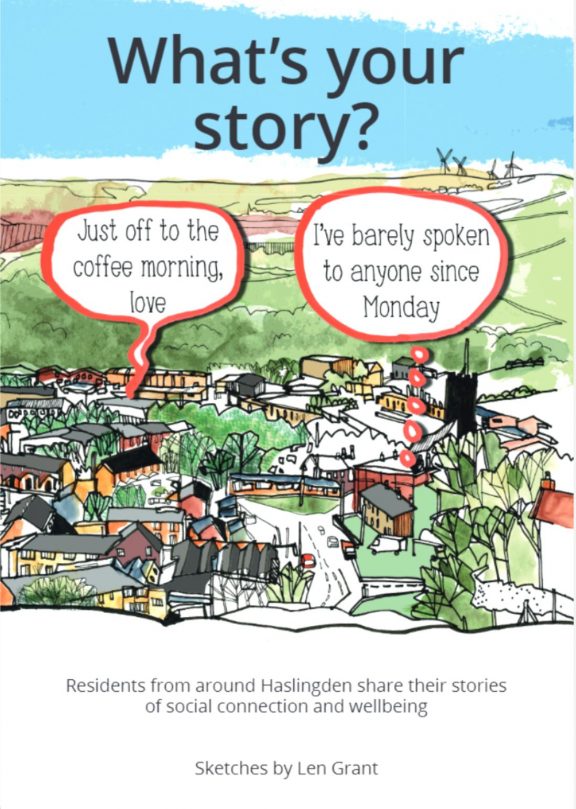
Producing an illustrated booklet
Producing an illustrated booklet to capture and disseminate findings
Residents collaborated with an artist, Len Grant, to produce an illustrated booklet based on the findings of this enquiry and documenting local accounts and experiences. The booklet was titled ‘What’s your story?’.
The booklet was presented to the wider community and local stakeholders to facilitate further discussions on social connectedness. Feedback on the art booklet was sought from the community and other stakeholders in three events held at different community organisations: Veterans in Communities, the Irish Democratic League, Haslingden Community Link and the local library.
2. Revisiting priorities for action
Information from the questionnaire, the booklet, and community discussions was brought together in the form of an action plan identifying three key areas of action: 1) Information and communication – how information about resources, events and organisations that support social connections could be communicated in the NfL; 2) Activities – how to identify existing activities, current gaps in provision and how to develop new activities; 3) Transport – how it impacted on social connectivity. The action plan was used by the Local Oversight Group (LOG) to oversee the activities of the Neighbourhood Resilience Programme in Worsley.
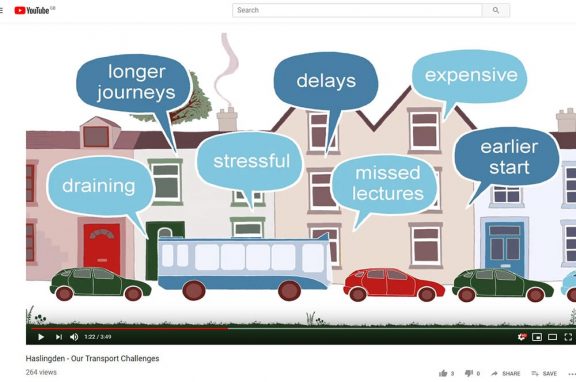
3. Enquiry on public transport and connection to other areas
These discussions led to a subsequent participative enquiry focussing on issues around transport and connectivity to other areas. The enquiry took place between December 2018 and January 2019. Resident Advisers conducted interviews and group discussions with 26 other residents on their experiences of transport services, problems with transport, the impact of problems on their lives and on possible solutions.
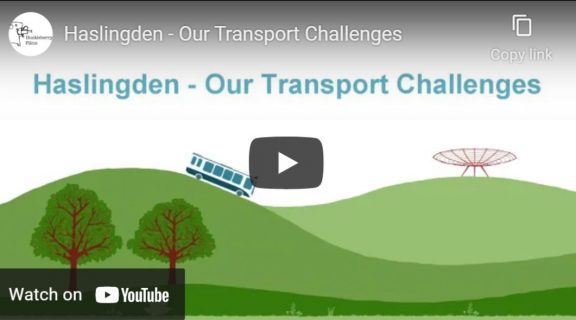
Producing an animation to capture and disseminate findings
The findings were summarised in an animated video produced in April 2019 aimed at publicising these findings. A community transport working group was established to take forward actions from the animation. A launch event for the animation took place in June 2019 bringing together a range of stakeholders from transport services, the NHS, local authorities and the voluntary sector. This event was the launch pad for conversations with health service providers and the community transport working group exploring how community transport options could be developed. The animation launch was attended by twenty-three residents, by professionals and several local district and county politicians.
Further, a community transport working group was established to take forward actions from the resident-led enquiry on transport.
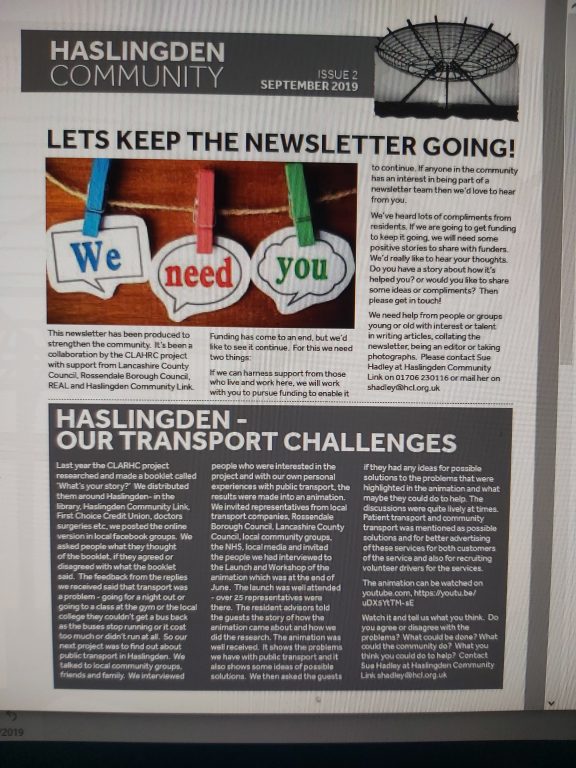
Taking action
Taking action
Community clean ups
Clean-up events were organised in April 2018 and an area of unkempt land in Worsley was cleaned and planted with new plants. This action was led by Haslingden Civic Pride who involved children from a local primary school and by Rossendale Borough Council.
Community newsletter
Three editions of a community newsletter were produced featuring articles written by local residents. The newsletter was funded by Rossendale Borough Council and Lancashire County Council. The newsletter included local stories and lists of NRP-related activities in the area. The LOG was involved in submitting articles and event listings and supporting the distribution of the newsletter.
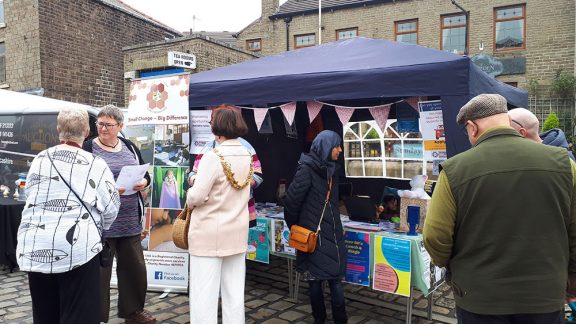
Unanticipated positive impacts
Unanticipated positive impacts of the NRP work
An unplanned outcome of the participative enquiries and the production of the art-based booklet was the commitment of £3,000 provided by the local authorities, through the Haslingden Community Partnership, to put up new notice boards in the area to promote local activities.
The art-based booklet was incorporated in community funding bids. Haslingden Community Link secured funding from Power to Change for a community kitchen through a bid which included the booklet in the submitted materials. Findings from the booklet also informed the Haslingden Environmental Plan which included plans to replant a community garden and making raised beds available for a local community group.
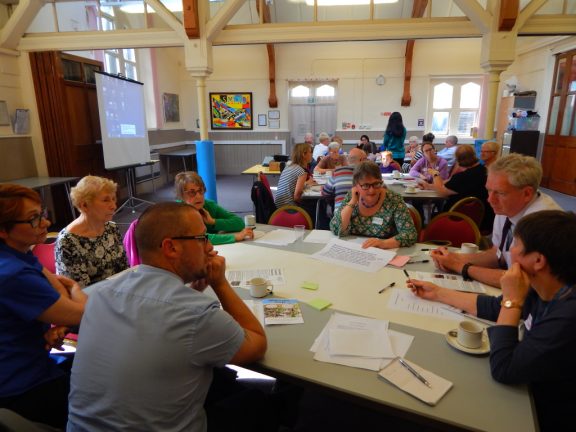
Unanticipated impacts continued
Rossendale Borough Council (RBC) responded to the content of the booklet by reviewing their responses to queries from the public and their involvement of residents in community issues. RBC instituted a change in the ways they were handling citizen requests.
Through discussions as part of the LOG, Rossendale Borough Council and Lancashire County Council (LCC) collaborated to address holiday hunger in Haslingden schools. RBC secured £1,500 from LCC to offer meals to children during the summer holidays.
Through contacts with LOG members, cycling classes were delivered to women at APNA.
The Resident Adviser role and model of citizen engagement was considered by Rossendale Borough Council for adoption. Resident Advisers were asked to attend Town Planning meetings to offer their perspective on new draft plans on the part of the council. Rossendale Borough Council, Lancashire County Council, and Haslingden Community Link have continued to work with Resident Advisors and have secured funding from Sport England for a community action research project with Residents Advisors as partners.
The Team
Resident Advisers: Dawn Allen, Hinah Qureshi, Dawn Vear
Local Authority Lead: Kayt Horsley
Academic Lead: Koser Khan
Contributors: Jackie Flynn – Community Projects and Partnerships, Rossendale Borough Council
Andy Laverty – East Lancashire Clinical Commissioning Group
Marilyn Protector – Councillor for Worsley, Rossendale Borough Council
Related Content

Related content
Lorem ipsum dolor sit amet, consectetur adipiscing elit. Nulla libero elit, viverra eget risus eu, posuere semper lorem. Lorem ipsum dolor sit amet, consectetur adipiscing elit. Nulla libero elit, viverra eget.
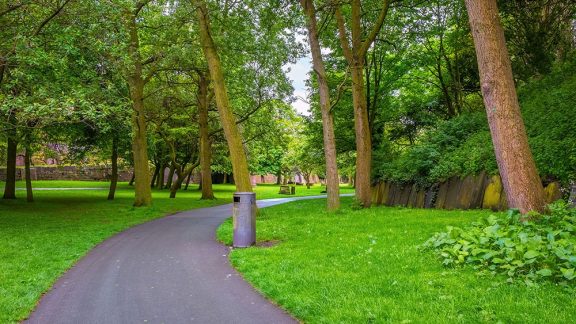
Related content
Lorem ipsum dolor sit amet, consectetur adipiscing elit. Nulla libero elit, viverra eget risus eu, posuere semper lorem. Lorem ipsum dolor sit amet, consectetur adipiscing elit. Nulla libero elit, viverra eget.
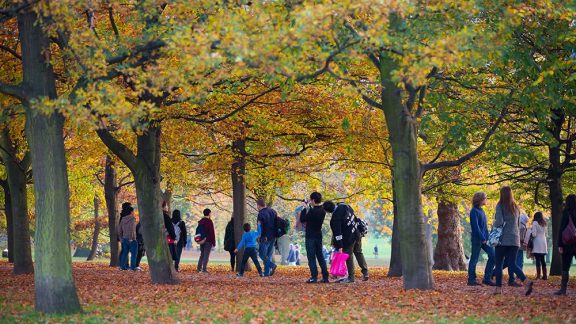
Related content
Lorem ipsum dolor sit amet, consectetur adipiscing elit. Nulla libero elit, viverra eget risus eu, posuere semper lorem. Lorem ipsum dolor sit amet, consectetur adipiscing elit. Nulla libero elit, viverra eget.